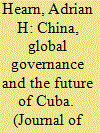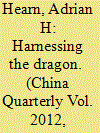| Srl | Item |
| 1 |
ID:
112546


|
|
|
|
|
| Publication |
2012.
|
| Summary/Abstract |
China's deepening engagement with Latin America has been accompanied by concerns about the Chinese government's regard for international conventions of economic governance. Critics claim that across Latin America and the Caribbean, Chinese aid and trade are characterised by excessive state intervention. This article argues that, for two reasons, the rationale for these misgivings is dissipating. First, since the onset of the global financial crisis, China has gained influence in multilateral institutions, prompting them toward greater acceptance of public spending in developing countries. Second, recent developments in Cuba show that China is actively encouraging the Western hemisphere's only communist country to liberalise its economy. China sits at the crossroads of these local and global developments, prompting Cuba toward rapprochement with international norms even as it works to reform them.
|
|
|
|
|
|
|
|
|
|
|
|
|
|
|
|
| 2 |
ID:
112504


|
|
|
|
|
| Publication |
2012.
|
| Summary/Abstract |
Chinese communities resident in Mexico and Cuba face a common problem: their dealings with business partners in China are perceived as a threat to national interests. In Mexico this concern emanates from manufacturers unable to compete with Chinese imports, and is evident in antagonistic news media and acts of hostility against Chinese businesses. In Cuba it stems from the state's stewardship over economic sovereignty, and is evident in efforts to assimilate Havana's Chinatown and its entrenched informal sector into a centralized scheme of commercial regulation. Interviews with policy makers, local officials and Chinese entrepreneurs indicate that the "rationalization" of Chinese ethnic allegiances for the greater public good is a critical step towards alleviating tensions. I conclude that both countries can leverage benefits from overseas Chinese communities, but to do so they must support their entrepreneurial activities, harness their networks to promote targeted imports and exports, and develop more culturally sensitive regulations.
|
|
|
|
|
|
|
|
|
|
|
|
|
|
|
|